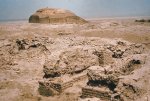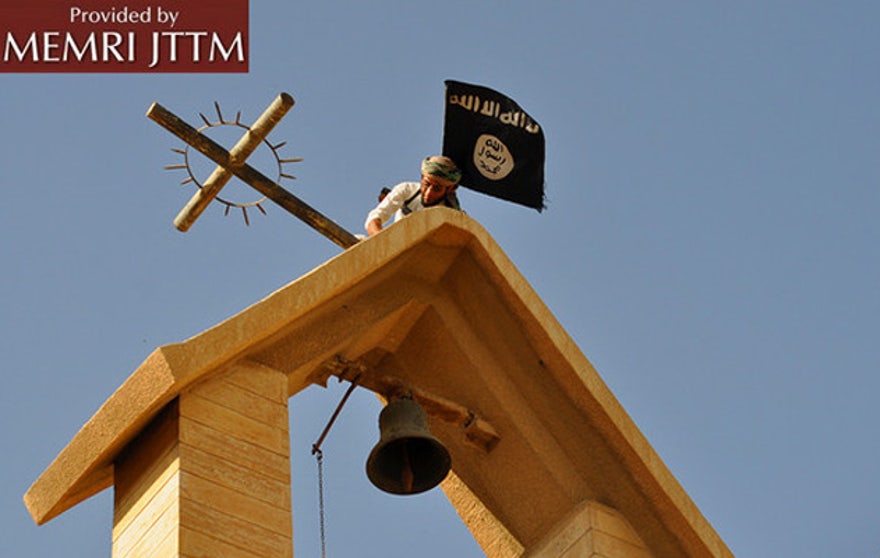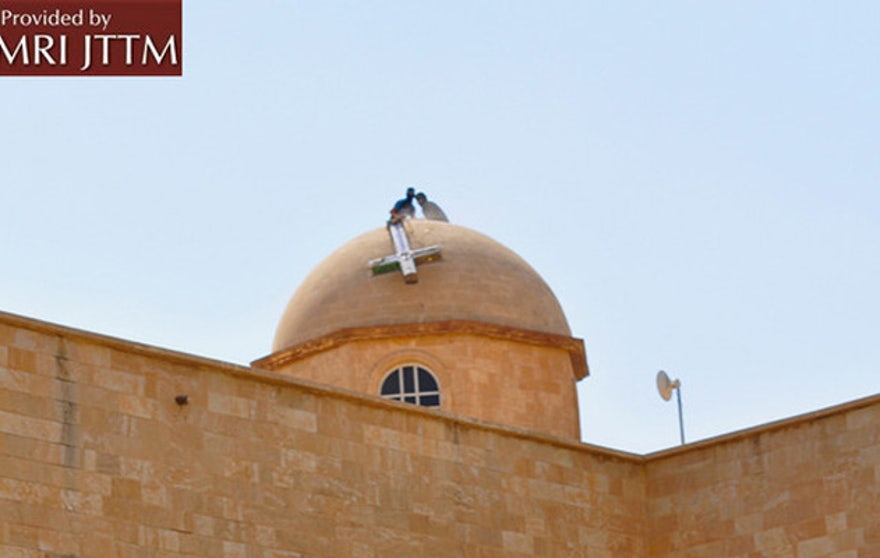Does the BIBLE describe a coming Nuclear War?
I believe is does, but we get glimpses of it from several places in Prophecy. When we look at the whole picture, all of a sudden, we begin to see a massive war that has not happened yet, and it's end result can only be explained as a full scale Nuclear War. This is a war that HAS TO HAPPEN prior to the Second Coming of Jesus Christ. My understanding of Biblical Prophecy is that while we are this side of the event, we can only make educated guesses at how it will all play out; HOWEVER, once the event has happed, it will absolutely fit the Prophecies perfectly. From the verses that I will show you, it is looking like this current War with ISIS, could lead to that unfulfilled War in Prophecy, that goes NUCLEAR.
The attack point of this War ultimately will aim at Israel, and Enemies still come from Syria, Iran, and Iraq, and Jordan gets caught in the middle, and thus they too suffer the devastation. If nukes are fired at Israel from any of those countries that I just mentioned, Israel with their Patriot missile batteries, will do their very best to knock them down before they cross their borders. That would cause many of them to fall in southern and western Jordan.
Isaiah 40:31 (HCSB)
[SUP]31 [/SUP] but those who trust in the LORD will renew their strength; they will soar on wings like eagles; they will run and not grow weary; they will walk and not faint.


 MECHANIZED INFANTRY
MECHANIZED INFANTRY

Isaiah 13:17-20 (HCSB)
[SUP]17 [/SUP] Look! I am stirring up the Medes{Iran} against them, who cannot be bought off with silver and who have no desire for gold.
[SUP]18 [/SUP] ⌊Their⌋ bows will cut young men to pieces. They will have no compassion on little ones; they will not look with pity on children.
[SUP]19 [/SUP] And Babylon {Iraq}, the jewel of the kingdoms, the glory of the pride of the Chaldeans, will be like Sodom and Gomorrah when God overthrew them.
[SUP]20 [/SUP] It will never be inhabited or lived in from generation to generation; a nomad will not pitch his tent there, and shepherds will not let ⌊their flocks⌋ rest there.
Isaiah 34:6-10 (HCSB)
[SUP]6 [/SUP] The LORD’s sword is covered with blood. It drips with fat, with the blood of lambs and goats, with the fat of the kidneys of rams. For the LORD has a sacrifice in Bozrah, a great slaughter in the land of Edom.
{Edom is Southern Jordan}
[SUP]7 [/SUP] The wild oxen will be struck down with them, and young bulls with the mighty bulls. Their land will be soaked with blood, and their soil will be saturated with fat.
[SUP]8 [/SUP] For the LORD has a day of vengeance, a time of paying back ⌊Edom⌋ for its hostility against Zion.
[SUP]9 [/SUP] ⌊Edom’s⌋ streams will be turned into pitch, her soil into sulfur; her land will become burning pitch.
[SUP]10 [/SUP] It will never go out—day or night. Its smoke will go up forever. It will be desolate, from generation to generation; no one will pass through it forever and ever.
Isaiah 17:1-3 (NKJV)
[SUP]1 [/SUP] The burden against Damascus. "Behold, Damascus will cease from being a city,And it will be a ruinous heap.
[SUP]2 [/SUP] The cities of Aroer are forsaken; They will be for flocks Which lie down, and no one will make them afraid.
{The area of Aroer would be the area northeast of Jerusalem in Jordan, where the main city would be Phildelphia (Amman), Jordan.}
[SUP]3 [/SUP] The fortress also will cease from Ephraim, The kingdom from Damascus, And the remnant of Syria; They will be as the glory of the children of Israel," Says the LORD of hosts.
Does ISRAEL remain unscathed in this possibly soon to be Nuclear War. NO, but out of the devastation comes the good news of Jews turning to Christ, and that leads to the Second Coming of our LORD.
Ezekiel 12:19-20 (HCSB)
[SUP]19 [/SUP] Then say to the people of the land: This is what the Lord GOD says about the residents of Jerusalem in the land of Israel: They will eat their bread with anxiety and drink their water in dread, for their land will be stripped of everything in it because of the violence of all who live there.
[SUP]20 [/SUP] The inhabited cities will be destroyed, and the land will become a desolation. Then you will know that I am Yahweh.”
Zechariah 14:11 (HCSB)
[SUP]11 [/SUP] People will live there, and never again will there be a curse of complete destruction. So Jerusalem will dwell in security.
Zephaniah 3:11-17 (HCSB)
[SUP]11 [/SUP] On that day {The day of the Second Coming.} you will not be put to shame because of everything you have done in rebelling against Me. For then I will remove your proud, arrogant people from among you, and you will never again be haughty on My holy mountain.
[SUP]12 [/SUP] I will leave a meek and humble people among you, and they will take refuge in the name of Yahweh.
[SUP]13 [/SUP] The remnant of Israel will no longer do wrong or tell lies; a deceitful tongue will not be found in their mouths. But they will pasture and lie down, with nothing to make ⌊them⌋ afraid.
[SUP]14 [/SUP] Sing for joy, Daughter Zion; shout loudly, Israel! Be glad and rejoice with all ⌊your⌋ heart, Daughter Jerusalem!
[SUP]15 [/SUP] The LORD has removed your punishment; He has turned back your enemy. The King of Israel, Yahweh, is among you; you need no longer fear harm.
[SUP]16 [/SUP] On that day it will be said to Jerusalem: “Do not fear; Zion, do not let your hands grow weak.
[SUP]17 [/SUP] Yahweh your God is among you, a warrior who saves. He will rejoice over you with gladness. He will bring ⌊you⌋ quietness with His love. He will delight in you with shouts of joy.”
And some of you thought GOD was finished with ISRAEL. I did not get into Tribulation Events, because we have enough to focus on just seeing there is potentially a pre-Second Coming War that probably will go NUCLEAR, very quickly; but sandwiched in between the above War and the Second Coming will be the Seven Year Peace Treaty with Israel and her enemies. That Peace Treaty will be orchestrated by the Anti-Christ, and his seven year Reign will also be known as the Great Tribulation. But let's save all that for another thread dealing specifically with that issue.
So in conclusion, Do I believe the above War is describing Nuclear strikes? Yes I do.
Do I believe the Current War with ISIS is the beginning of that War? I think that is highly probable.
I believe is does, but we get glimpses of it from several places in Prophecy. When we look at the whole picture, all of a sudden, we begin to see a massive war that has not happened yet, and it's end result can only be explained as a full scale Nuclear War. This is a war that HAS TO HAPPEN prior to the Second Coming of Jesus Christ. My understanding of Biblical Prophecy is that while we are this side of the event, we can only make educated guesses at how it will all play out; HOWEVER, once the event has happed, it will absolutely fit the Prophecies perfectly. From the verses that I will show you, it is looking like this current War with ISIS, could lead to that unfulfilled War in Prophecy, that goes NUCLEAR.
The attack point of this War ultimately will aim at Israel, and Enemies still come from Syria, Iran, and Iraq, and Jordan gets caught in the middle, and thus they too suffer the devastation. If nukes are fired at Israel from any of those countries that I just mentioned, Israel with their Patriot missile batteries, will do their very best to knock them down before they cross their borders. That would cause many of them to fall in southern and western Jordan.
Isaiah 40:31 (HCSB)
[SUP]31 [/SUP] but those who trust in the LORD will renew their strength; they will soar on wings like eagles; they will run and not grow weary; they will walk and not faint.


Isaiah 13:17-20 (HCSB)
[SUP]17 [/SUP] Look! I am stirring up the Medes{Iran} against them, who cannot be bought off with silver and who have no desire for gold.
[SUP]18 [/SUP] ⌊Their⌋ bows will cut young men to pieces. They will have no compassion on little ones; they will not look with pity on children.
[SUP]19 [/SUP] And Babylon {Iraq}, the jewel of the kingdoms, the glory of the pride of the Chaldeans, will be like Sodom and Gomorrah when God overthrew them.
[SUP]20 [/SUP] It will never be inhabited or lived in from generation to generation; a nomad will not pitch his tent there, and shepherds will not let ⌊their flocks⌋ rest there.
Isaiah 34:6-10 (HCSB)
[SUP]6 [/SUP] The LORD’s sword is covered with blood. It drips with fat, with the blood of lambs and goats, with the fat of the kidneys of rams. For the LORD has a sacrifice in Bozrah, a great slaughter in the land of Edom.
{Edom is Southern Jordan}
[SUP]7 [/SUP] The wild oxen will be struck down with them, and young bulls with the mighty bulls. Their land will be soaked with blood, and their soil will be saturated with fat.
[SUP]8 [/SUP] For the LORD has a day of vengeance, a time of paying back ⌊Edom⌋ for its hostility against Zion.
[SUP]9 [/SUP] ⌊Edom’s⌋ streams will be turned into pitch, her soil into sulfur; her land will become burning pitch.
[SUP]10 [/SUP] It will never go out—day or night. Its smoke will go up forever. It will be desolate, from generation to generation; no one will pass through it forever and ever.
Isaiah 17:1-3 (NKJV)
[SUP]1 [/SUP] The burden against Damascus. "Behold, Damascus will cease from being a city,And it will be a ruinous heap.
[SUP]2 [/SUP] The cities of Aroer are forsaken; They will be for flocks Which lie down, and no one will make them afraid.
{The area of Aroer would be the area northeast of Jerusalem in Jordan, where the main city would be Phildelphia (Amman), Jordan.}
[SUP]3 [/SUP] The fortress also will cease from Ephraim, The kingdom from Damascus, And the remnant of Syria; They will be as the glory of the children of Israel," Says the LORD of hosts.
Does ISRAEL remain unscathed in this possibly soon to be Nuclear War. NO, but out of the devastation comes the good news of Jews turning to Christ, and that leads to the Second Coming of our LORD.
Ezekiel 12:19-20 (HCSB)
[SUP]19 [/SUP] Then say to the people of the land: This is what the Lord GOD says about the residents of Jerusalem in the land of Israel: They will eat their bread with anxiety and drink their water in dread, for their land will be stripped of everything in it because of the violence of all who live there.
[SUP]20 [/SUP] The inhabited cities will be destroyed, and the land will become a desolation. Then you will know that I am Yahweh.”
Zechariah 14:11 (HCSB)
[SUP]11 [/SUP] People will live there, and never again will there be a curse of complete destruction. So Jerusalem will dwell in security.
Zephaniah 3:11-17 (HCSB)
[SUP]11 [/SUP] On that day {The day of the Second Coming.} you will not be put to shame because of everything you have done in rebelling against Me. For then I will remove your proud, arrogant people from among you, and you will never again be haughty on My holy mountain.
[SUP]12 [/SUP] I will leave a meek and humble people among you, and they will take refuge in the name of Yahweh.
[SUP]13 [/SUP] The remnant of Israel will no longer do wrong or tell lies; a deceitful tongue will not be found in their mouths. But they will pasture and lie down, with nothing to make ⌊them⌋ afraid.
[SUP]14 [/SUP] Sing for joy, Daughter Zion; shout loudly, Israel! Be glad and rejoice with all ⌊your⌋ heart, Daughter Jerusalem!
[SUP]15 [/SUP] The LORD has removed your punishment; He has turned back your enemy. The King of Israel, Yahweh, is among you; you need no longer fear harm.
[SUP]16 [/SUP] On that day it will be said to Jerusalem: “Do not fear; Zion, do not let your hands grow weak.
[SUP]17 [/SUP] Yahweh your God is among you, a warrior who saves. He will rejoice over you with gladness. He will bring ⌊you⌋ quietness with His love. He will delight in you with shouts of joy.”
And some of you thought GOD was finished with ISRAEL. I did not get into Tribulation Events, because we have enough to focus on just seeing there is potentially a pre-Second Coming War that probably will go NUCLEAR, very quickly; but sandwiched in between the above War and the Second Coming will be the Seven Year Peace Treaty with Israel and her enemies. That Peace Treaty will be orchestrated by the Anti-Christ, and his seven year Reign will also be known as the Great Tribulation. But let's save all that for another thread dealing specifically with that issue.
So in conclusion, Do I believe the above War is describing Nuclear strikes? Yes I do.
Do I believe the Current War with ISIS is the beginning of that War? I think that is highly probable.
Isaiah 40:9-31 is prophesy about Jesus Christ is it not?.......
Isaiah 40:9-13
9O Zion, that bringest good tidings, get thee up into the high mountain; O Jerusalem, that bringest good tidings, lift up thy voice with strength; lift it up, be not afraid; say unto the cities of Judah, Behold your God!
10Behold, the Lord GOD will come with strong hand, and his arm shall rule for him: behold, his reward is with him, and his work before him.
11He shall feed his flock like a shepherd: he shall gather the lambs with his arm, and carry them in his bosom, and shall gently lead those that are with young.
12Who hath measured the waters in the hollow of his hand, and meted out heaven with the span, and comprehended the dust of the earth in a measure, and weighed the mountains in scales, and the hills in a balance?
13Who hath directed the Spirit of the LORD, or being his counseller hath taught him?
Isaiah 40:28-31
28Hast thou not known? hast thou not heard, that the everlasting God, the LORD, the Creator of the ends of the earth, fainteth not, neither is weary? there is no searching of his understanding.
29He giveth power to the faint; and to them that have no might he increaseth strength.
30Even the youths shall faint and be weary, and the young men shall utterly fall:
31But they that wait upon the LORD shall renew their strength; they shall mount up with wings as eagles; they shall run, and not be weary; and they shall walk, and not faint.
The verse you quoted in the op....... "they will soar on wings like eagles; they will run and not grow weary; they will walk and not faint" is a reference to those who would wait on and trust in Christ (have faith) to save them after His coming,....... they will have renewed strength for trusting and waiting on Him....... the word eagle is used as a metaphor for strength given to those who put their faith in Jesus Christ.......this is NOT about "mechanized infantry", nuclear war, or fighter jets....... that's a huge leap from truth Orv and can only be drawn by taking Isaiah 40 way out of context.
Isaiah 13:20 is about judgement against Babylon for it's sacking of the kingdom of Judah. History and the bible record Cyrus the great ("the Medes").......who sacked Babylon (modern day Iraq) and as it is written " It will never be inhabited or lived in from generation to generation as it is to this day.

Image source:
Also one more thing to take into consideration when pulling verses out of the OT.......In the east the language is different than the west. Word's and statements in languages express emotion often in a metaphoric sense. Emotion is often over exaggerated metaphorically in speech in eastern languages in comparison to the west. We might say in the west to describe a woman as such......a woman has natural beauty; her long flowing hair, her sparkling eyes, and soft skin makes her beautiful and to be desired in the hearts of men. In the East they might say.......a woman's beauty is likened to the delicate flower blossom set beneath the light of heaven elegantly flowing with the warm embrace of the gentle winds; what man would not desire a wife?.......Language and context is important. Besides the obvious that the op is speculative at best it is based on cherry picking verses out of context to paint a picture of fear and future nuclear war. This kind of topic does not edify in love, it just attempts to distort the truth.
Last edited:







